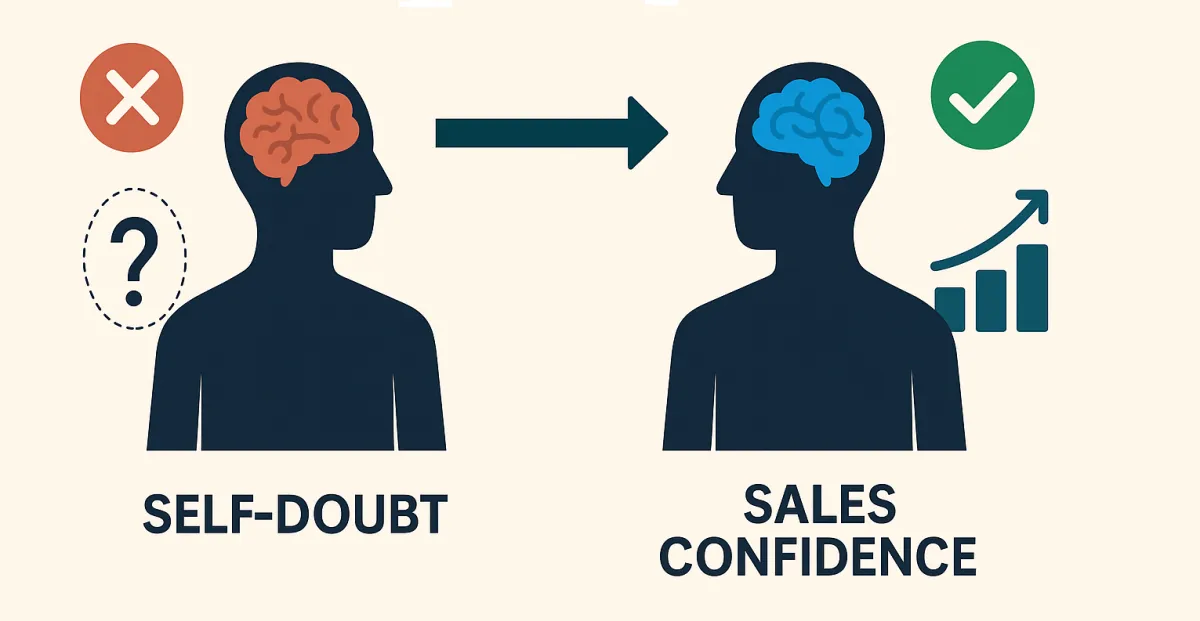Contact Us
We’re Here to Help You Sell Smarter!
Contact Us
Have a question about our sales courses, membership,
or which option is right for you?
Reach out — we’re happy to help.
Whether you're just getting started or deep in your sales journey, the Sales Insights Academy team is here to support you.
+61 0483 933 088
Gold Coast, Queesland Australia

From Self-Doubt to Sales Confidence: How Training Can Change Your Results
“Confidence is preparation. Everything else is beyond your control".
- Richard Kline
Introduction:
Confidence is one of the most visible traits of top-performing salespeople - but it’s also one of the least talked about when it’s missing. Whether it’s the hesitation before asking a tough question, the fear of sounding pushy, or the second-guessing after a call that didn’t go as planned, even skilled professionals can struggle with self-doubt.
What’s often overlooked is that confidence in sales isn’t just about personality - it’s about psychology. It's built through clarity, preparation, and understanding what actually drives buyer decisions. When you understand why people buy (and why they don’t), you stop guessing, and start leading.
In this article, we’ll explore the real reasons sales confidence breaks down - and how a deeper understanding of buyer behaviour can shift your entire approach, helping you replace hesitation with certainty and self-doubt with control.
Why Confidence is the Real Sales Multiplier
Sales confidence isn’t just a nice-to-have — it’s foundational to success. When salespeople feel confident, they:
Ask bolder, more insightful questions
Challenge buyer assumptions without fear
Stay calm in the face of objections
Project authority and trustworthiness
On the flip side, self-doubt leads to hesitation, overtalking, discounting too quickly, or letting opportunities die in the pipeline. It doesn’t matter how great the product or how warm the lead - if a salesperson lacks confidence, the deal is at risk.
Where Confidence Breaks Down in Sales
Confidence can dip at any stage of a sales career. Here’s where it tends to falter:
Early in a sales role, when there’s no roadmap or mental model to follow
After a string of rejections or missed targets
When facing complex buyer objections you don’t know how to reframe
When you’re expected to “sell consultatively” but don’t feel equipped with the right techniques
The root of this self-doubt often isn’t lack of effort - it’s lack of understanding. If you don’t know how buyers think, or what psychological triggers move them forward, even the best pitch feels like a guess.
Why Confidence Comes from Understanding Buyers
Real, lasting confidence doesn’t come from pumping yourself up before a call. It comes from knowing - not hoping - that what you’re doing works.
That’s the core of consultative selling: helping buyers make better decisions by uncovering their needs, drivers, fears, and goals. When you understand how and why people buy, you gain control of the conversation - and confidence follows.
What Confident Salespeople Do Differently
The difference between a confident seller and a hesitant one is rarely knowledge. It’s application. Here’s how confident, consultative sellers stand out:
Confident, Consultative Salespeople
✅ Ask more questions to understand the buyer
✅ Embrace objections as insight opportunities
✅ Diagnose first, then tailor the recommendation
✅ Seek clarity
Self-Doubt Salespeople
❌ Talk more to compensate for nerve
❌ Avoid objections or rush through them
❌ Pitch early and hope it sticks
❌ Seek validation
Confidence isn’t just visible in tone or body language - it shows in how salespeople run the sales conversation.

How The Psychology of Consultative Selling Builds Confidence
Inside Sales Insights Academy, The Psychology of Consultative Selling course is built around this exact idea: that confidence comes from clarity, and clarity comes from understanding buyer psychology.
In the course, sales professionals learn how to:
Ask layered, trust-building questions without sounding scripted
Uncover dominant buying motives and emotional drivers
Recognise and influence different buyer types
Use psychological triggers like urgency, fear of loss, and cognitive dissonance to move deals forward
Handle objections without defensiveness or pressure tactics
Instead of guessing what the buyer is thinking, consultative sellers are trained to anticipate it - and lead with empathy, curiosity, and control.
Building Confidence That Lasts
If you want to build sales confidence that doesn’t fade after a pep talk or podcast, here’s what matters:
Competence: Build skill in areas that drive results - like questioning, qualifying, and objection handling
Clarity: Understand how buyers think and why they respond the way they do
Practice: Apply what you learn through role play, coaching, and feedback
Community: Surround yourself with others focused on growth and mastery
Personalisation: Use tools like the Sales Insights Evaluation to map your strengths and tailor your training

Final Thoughts: Confidence is a Skill, Not a Trait
If you’ve ever walked away from a sales call thinking “I could’ve done better,” you’re not alone - and you’re not underperforming. You’re simply ready to take control of your development.
By understanding how buyers think and learning how to lead the sales conversation with insight and empathy, you can replace guesswork with structure - and self-doubt with quiet, consistent confidence.
Ready to shift from hesitation to high performance?
Explore the The Psychology of Consultative Selling course inside Sales Insights Academy and start building the confidence that closes.


Clarity
Uncover your sales
strengths with precision.

Confidence
Sell with ease, not pressure.

Growth
Turn insights into income

FOLLOW US
COMPANY
LEGAL
Copyright 2025. Sales Insights Academy. All Rights Reserved.

